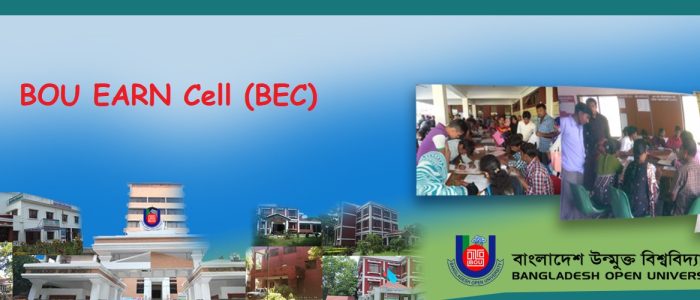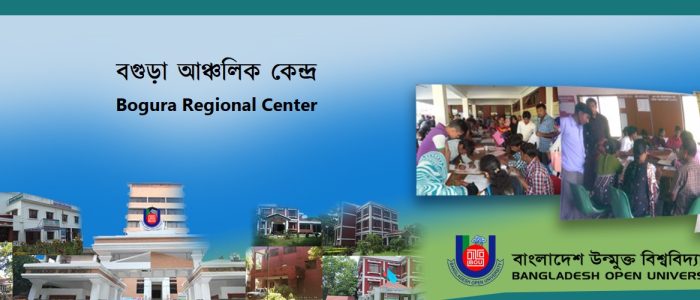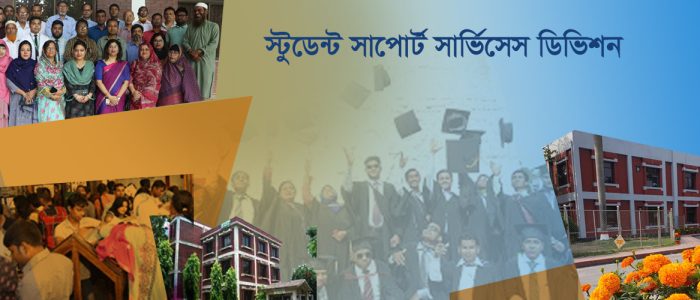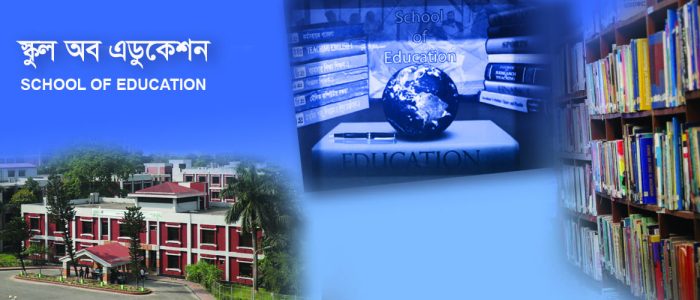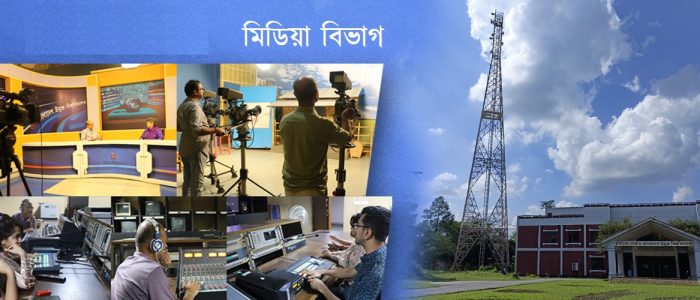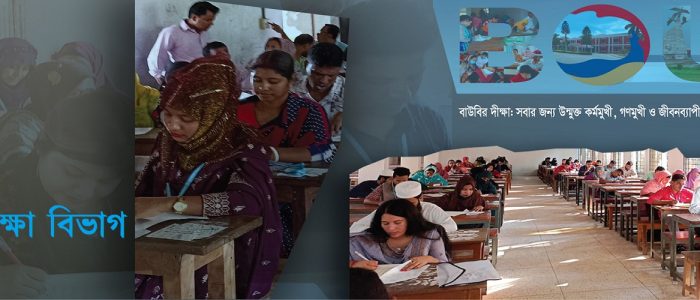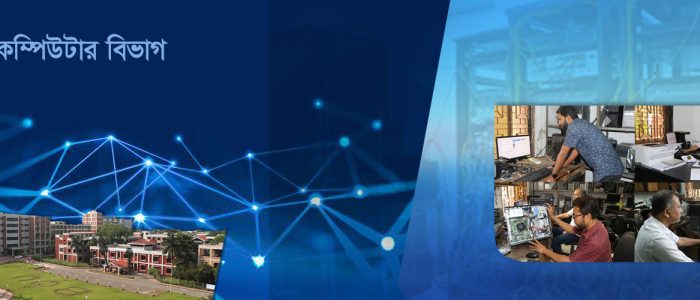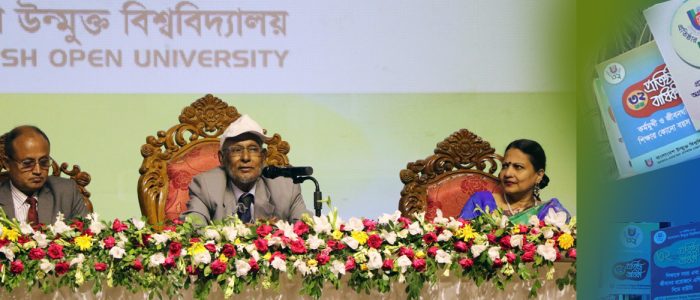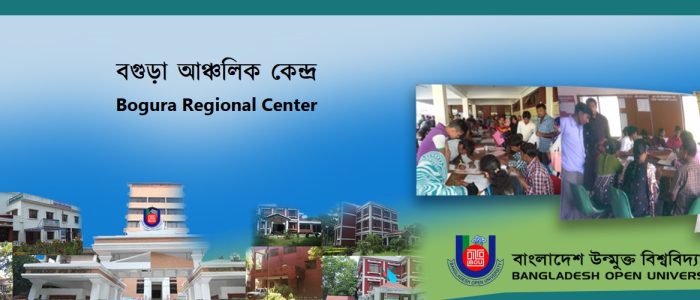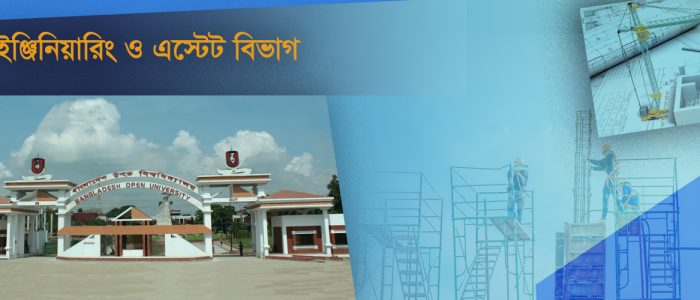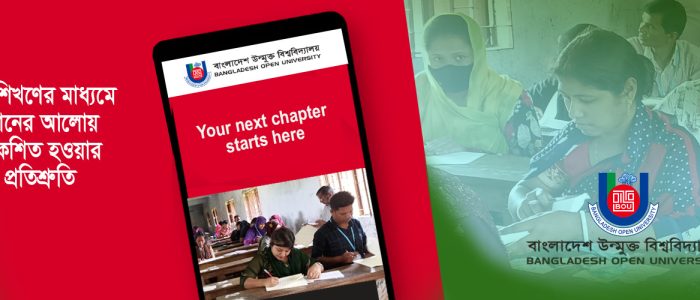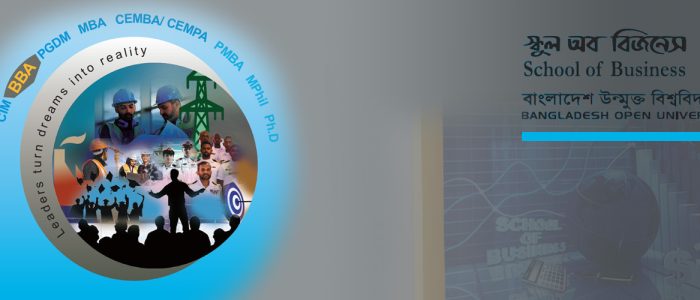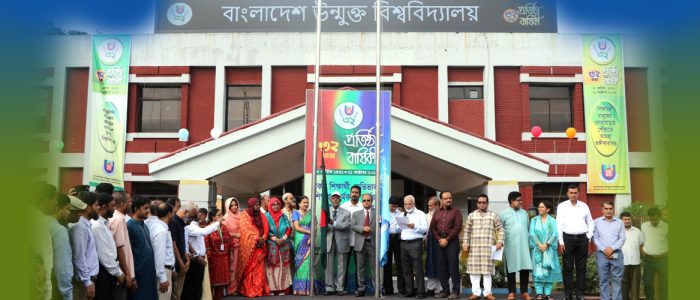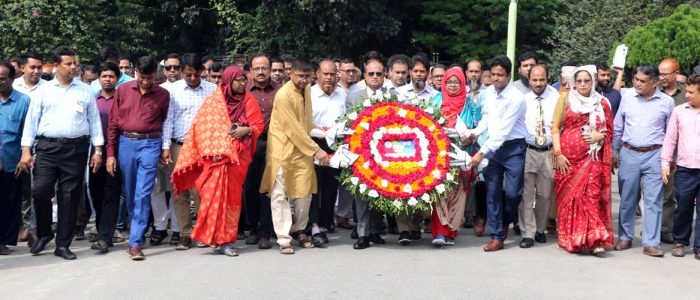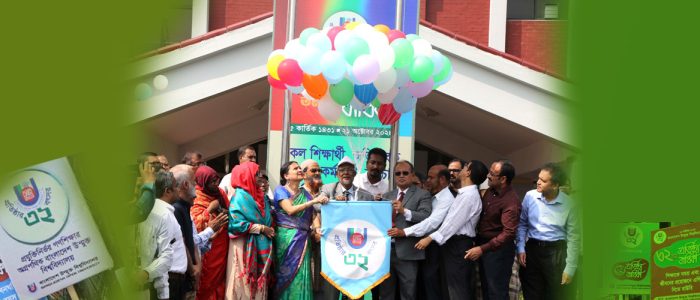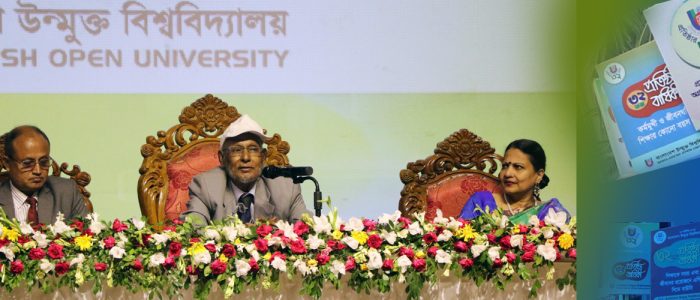
” বৈষম্য বিরোধী ছাত্র আন্দোলনে যে সকল ছাত্র-জনতা শহীদ হয়েছেন তাদের প্রতি বাউবি কর্তৃপক্ষ গভীর শোক প্রকাশ ও শহীদদের রুহের মাগফেরাত কামনা করছে। সকল শহীদদের শোক-সন্তপ্ত পরিবারের সদস্যদের প্রতি গভীর সমবেদনা ও সহমর্মিতা জ্ঞাপন করছে। “
” বৈষম্য বিরোধী আন্দোলনে বাউবির শিক্ষার্থী আহত হওয়ায় বাউবি পরিবার মর্মাহত “

Dr. A. B. M. Obaidul Islam
Vice-Chancellor
Dr. A. B. M. Obaidul Islam
Dr. A B M Obaidul Islam obtained his B.Sc. (Honours) and M.Sc. degrees in Physics from University of Dhaka (DU) in 1987 and 1988, respectively. During his M.Sc. he conducted research on ‘Preparation of plasma-polymerized m-xylene thin films and investigation of their properties’.
After his M.Sc. Dr. Islam visited Department of Physics, Rajasthan University, Jaipur, India under the fellowship program of Abdus Salam International Centre for Theoretical Physics (ICTP) for the 3 months started from October 1992 and worked as a research fellow in the Semiconductor Technology research Center (STRC), DU from January 19932 to March 1994. Dr. Islam started his career as a Lecturer in Physics at University of Dhaka, in March 1994 and became Professor in February 2008. He obtained Ph.D. in Materials Engineering from Department of Electrical and Electronic Engineering, Toyama University, Japan in 1999 under the Japanese Government Scholarship program. During his Ph.D., he conducted research on “Surface modification of GaAs and CVD diamond by layered- compound GaS”.
He then performed postdoctoral research at the Department of Materials Science, Darmstadt University of Technology, Germany from 2000 to 2002 under the Alexander von Humboldt Foundation fellowship program. He worked on “Electronic properties of quasi-van der Waals- epitaxy interfaces using Molecular Beam Epitaxy (MBE) method”. Dr. Islam visited Abdus Salam International Centre for Theoretical Physics (ICTP), Trieste, Italy as Regular Associateship of ICTP from June, 2003 – August, 2003.
He then performed second postdoctoral research at Solar Energy Group, Materials and Engineering Research Institute, Sheffield Hallam University, UK under Commonwealth Academic Staff Fellowship program from October, 2005 – March, 2006. He worked on “Graded bandgap multilayer thin film solar cells based on electrodeposited CuInGaSe2 layer”. He visited Department of Materials Science, Darmstadt University of Technology, Germany under Alexander von Humboldt Foundation Fellowship Program from September – October, 2009 as a visiting Researcher and he also visited University of Toyama, Japan under Japan Student Services Organization (JASSO) Fellowship from January, 2010 – March, 2010 as a visited scholar.
Dr. Islam then performed another postdoctoral research at Interfaces and Correlated Electrons Systems Group, Faculty of Science and Technology, University of Twente, Enschede, The Netherlands January, 2012 – June, 2012 under Erasmus Mundus Fellowship program. He worked on “Thin Film Photovoltaic Solar Cells based on Cu2ZnSnS4 Material using low-cost Electrodeposition Method”.
Dr. Islam is deeply engaged in researching the structural, electrical, and optical properties of semiconductor thin films for solar cell applications. Using cost-effective Electrodeposition and Chemical Bath Deposition methods, he grows thin films on transparent conducting oxide glass substrates. His focus lies in optimizing these layers for enhanced crystallinity and minimal defects. With access to state-of-the-art facilities at Dhaka University, he thoroughly characterizes the deposited films. Till to-date, nearly 30 students have completed their research work for their M.S. and M.Phil. degree under his direct supervision, and around 40 research articles including book chapters have been published in the peer reviewed Journals from his research. Dr. Islam also taught in different private Universities as a part-time faculty.
Dr. Islam served the nation from different categories, such as,. General Secretary, Dhaka University Teacher’s Association (DUTA), Secretary General, Federation of Bangladesh University Teachers Association, Joint-Secretary, Dhaka University Teacher’s Association (DUTA), Elected EC Member, DUTA, Senate Member, University of Dhaka, The Bangladesh Physical Society (BPS), Association of Humboldt Fellows in Bangladesh (AHFB), Alumni Association of German Universities in Bangladesh (AAGUB). Former General Secretary, Japanese Universities Alumni Association in Bangladesh (JUAAB).
Message from the Vice-Chancellor
Bangladesh Open University (BOU) is a place of hope, a place that inspires imagination, a place that nurtures creativity, and a hub of innovative ideas. We are delighted to welcome you to Bangladesh Open University where your energy and excitement enrich our vibrant educational life. Whether you are beginning or continuing your educational journey with us, we look forward to learning, exploring, and growing together. We appreciate your decision to invest in your academic journey with BOU.
Bangladesh Open University is the only open and distance learning institution in the country. The university was established in 1992 with a view to supporting governments’ educational policies, both short and long-run, by offering flexible and affordable educational opportunities to disadvantaged people who are unable to attend traditional academic institutions/universities for various socio-economic problems. BOU provide educational opportunities to students at pre-University levels through open schooling and offer a wide range of higher education programs including diploma, bachelor’s, master’s, MPhil and PhD degrees through open and distance learning (ODL), without any age restrictions. BOU is committed to spread action-oriented, mass-oriented and lifelong education to the doorstep of its stakeholders through its countrywide academic network.
The university utilizes a blended learning approach, combining self-study materials, face-to-face tutorials, e-learning centres, multimedia resources, and online platforms to deliver education to its students. This approach allows individuals from diverse backgrounds and locations to access quality education at their own pace and convenience.
BOU caters to a diverse student population, including working professionals, individuals with family responsibilities, and those residing in remote areas with limited access to traditional educational institutions. The university’s commitment to inclusivity and accessibility has made it a popular choice among professional and adult learners and individuals in home and abroad seeking to enhance their skills and knowledge while balancing other commitments.
With its mission to promote lifelong learning and bridge the educational gap, Bangladesh Open University has been playing a significant role in expanding educational opportunities in the country and expatriate Bangladeshi. Its innovative approach to open and distance learning has not only empowering individuals but also contributed to the socio-economic development of Bangladesh by equipping students with the necessary skills and qualifications for better employment prospects.
Our mission and vision is to provide our students with a holistic education. In practical terms, this means that besides equipping our students with excellent academic skills and competencies, BOU will make you a person of distinction to make your contribution to society.
We wish you much success in the years ahead and hope together we will make a change for the better future of the country and ourselves.

Profile of Dr. Dil Rowshan Zinnat Ara Nazneen
Distinguished Professor of Political Science with a 36-year academic career, including 2 decades as a professor. Renowned for expertise in areas such as Local Government, Research Methodology, Ethnicity, and Conflict Resolution. Supervised 6 PhDs and 31 MPhil degrees and authored numerous books and articles, contributing significantly to the field. Committed to nurturing the next generation of political science scholars, fostering research excellence, and mentoring emerging talents.

Professor Sayeed Ferdous, Ph.D
Professor Sayeed Ferdous used to teach anthropology at Jahangirnagar University, Bangladesh, since 1995. He was trained in Anthropology from Jahangirnagar University, followed by Master of Arts in Social Science from the University of Amsterdam, Netherlands and Doctorate from Lancaster University, UK. Dr. Ferdous finds his niche in the blurred zone of History and Anthropology. Sayeed’s research interest includes South Asian Studies, Historiography, Memory/Forgetting, The Subaltern, Postcolonial Nation, State, and Nationalism. His book titled Partition as Border-Making: East Bengal, East Pakistan, and Bangladesh was published in 2021 by Taylor and Francis. Focusing upon the significance of mundane in history and its presentness, this research contributes in the understanding of postcolonial South Asia beyond “indocentrism”; in partition studies; as well as in border and borderland studies. At present, Sayeed is jointly editing a Bangladesh Reader, waiting to be published by Taylor and Francis. He has also contributed to anthologies and journals related to the 1947 Partition. In 2021, he jointly conducted a research project on the Partition migrants to Dhaka, in partnership with Goethe Institute, Bangladesh, titled “Inherited Memories (Part II).” In 2023-24 Professor Ferdous served as a visiting fellow in the Institute for South Asia Studies, University of California, Berkeley. Besides teaching and research, Sayeed loves to talk about varied issues on social media handles.
Message from the Pro Vice Chancellor (Administration)
Professor Sayeed Ferdous, Ph.D
Every institution has its unique features. However, Bangladesh Open University is one of its kind in the country. Unlike other centralized public or private universities, BOU started its journey by decentralizing initiatives. Aimed to offer education to the deprived, marginals, and the left-outs from the regular academic programme, BOU has been serving the nation since its establishment in 1992 to till date. Public institutions run by taxpayers’ money have responsibilities and accountability to the public. Keeping that in mind is crucial, particularly after the recent uprising in Bangladesh, marked by the sacrifices of the millions. By offering diverse and quality education through its strong network and organs across the landscape, BOU will meet its promises to the nation. I believe the competent and committed team of BOU will work relentlessly to fulfill its mission and materialize its visionary goals.

Dr. Abul Hasnat Md. Shamim
I was born on 15th July 1976 in Chapai Nawabgonj district, Bangladesh. I obtained B.Sc. (Hons.) and M.Sc. degrees in Soil Science from Dhaka University (DU) securing First Class in both the cases. I received several prestigious awards from DU keeping the same trend in PhD studies (2007-2010) at Okayama University, Japan under Japanese Government Monbukagakusho scholarship.
During my PhD research I found slaking and drying is the most efficient and cost-effective method for clarifying of saline soil. To have a breakthrough in my current project, I needs to confirm that soil slaking is a salt releasing process and does not degrade the infiltration characteristics of soil by column test which simulates actual soil layer in the field. I also need to develop a simulation method to know, how much salt will dissolve to outer solution? how much will shift to exchange phase? how much will precipitate after drying the soil?
Currently, I am involved in extraction, purification and activity testing of bioactive compounds from medicinal plants of Bangladesh as well as soil Streptomyces spp. The purpose of searching bioactive compounds from medicinal plants and soil Streptomyces spp. is to develop new agrochemicals against crop pathogens and new antibiotics against multidrug resistance human pathogens.
I joined Bangladesh Open University (BOU) in March 2005 as a Lecturer in Soil Science. I have been doing job as a Professor since May 2018 at the School of Agriculture and Rural Development (SARD), BOU. Recently, I joined as a Dean of SARD of BOU. According to the act, 15(1), 1992, order of President and University Chancellor Mohammed Shahabuddin appointed me as new Treasurer of the same University on 7 November 2024 for the next four years.
I received extensive training on capacity building for Open and Distance Learning materials. I play a significant role in all activities of SARD providing education in distance and face to face modes. My field of interests include Problem soils and their sustainable uses, Ecosystems of salt affected soils and their management, Analytical Chemistry etc. I am engaged in different National and International project. I have published more than 40 research articles and 09 books in peer-reviewed National and International reputed Journals.
I have been actively participated in many international conferences and symposia and presented my research findings. I am an active member of many professional societies at home and abroad and serving as editor and reviewers of some international journals.
Professor Dr. Abul Hasnat Md. Shamim, Treasurer, BOU
Professor Dr. Abul Hasnat Md. Shamim, Dean School of Agriculture and Rural Development (SARD) of Bangladesh Open University (BOU) appointed as new Treasurer of the University on 7 November 2024. According to the act, 15 (1), 1992, order of President and University Chancellor Mohammed Shahabuddin appointed Prof. Dr. Md. Shamim for the next four years.
Dr. Shamim was born on 15th July 1976 in Chapai Nawabgonj district, Bangladesh. He obtained B.Sc. (Hons.) and M.Sc. degrees in Soil Science from Dhaka University (DU) securing First Class in both the cases. He received several prestigious awards from DU keeping the same trend in PhD studies (2007-2010) at Okayama University, Japan under Japanese Government Monbukagakusho scholarship.
During his PhD research, he found slaking and drying is the most efficient and cost-effective method for clarifying of saline soil. To have a breakthrough in his current project, he needs to confirm that soil slaking is a salt releasing process and does not degrade the infiltration characteristics of soil by column test which simulates actual soil layer in the field. He also needs to develop a simulation method to know, how much salt will dissolve to outer solution? how much will shift to exchange phase? how much will precipitate after drying the soil?
Currently, he was involved in extraction, purification and activity testing of bioactive compounds from medicinal plants of Bangladesh as well as soil Streptomyces spp. The purpose of searching bioactive compounds from medicinal plants and soil Streptomyces spp. is to develop new agrochemicals against crop pathogens and new antibiotics against multidrug resistance human pathogens.
Dr. Shamim joined Bangladesh Open University in March 2005 as a Lecturer in Soil Science. Now he has been doing job as now Professor since May 2018 at SARD, BOU. He received extensive training on capacity building for Open and Distance Learning materials. He plays a significant role in all activities of SARD providing education in distance and face to face modes. His field of interests include Problem soils and their sustainable uses, Ecosystems of salt affected soils and their management, Analytical Chemistry etc. He is engaged in different National and International project. He has published more than 40 research articles and 09 books in peer-reviewed National and International reputed Journals.
He has been actively participated in many international conferences and symposia and presented his research findings. He is an active member of many professional societies at home and abroad and serving as editor and reviewers of some international journals.
About Bangladesh Open University
Historial Outline
The need for an open university in Bangladesh was felt long ago. The history of distance education in Bangladesh dates back to 1956 when the Education Directorate was assigned with the responsibility for distribution of 200 radio receivers to educational institutions. This led to the creation of an Audio-Visual Cell, which was upgraded to the Audio-Visual Education Centre in 1962. No further progress in distance education was made till 1971.
After Independence, Bangladesh faced the challenge of meeting the educational needs of mass people. To meet this challenge the necessity for a new mode of education was widely felt. As a sequel to that feeling, the School Broadcasting Pilot Project was launched in 1978. The project was transformed into National Institute of Educational Media and Technology (NIEMT) in 1983.
NIEMT was later replaced by the Bangladesh Institute of Distance Education (BIDE) in 1985. Apart from producing audio-visual materials, BIDE offered the Bachelor of Education (B.Ed) program in distance mode. The success of BIDE encouraged policymakers to take up a major plan for establishing an open university. The plan became a reality in October 1992 when the Bangladesh Open University Act 1992 was passed in the Parliament.
BOU at a Glance
| BOU Established | October 21, 1992 |
|---|---|
| Type | Public University |
| Chancellor | Mohammed Shahabuddin Honorable President of the People’s Republic of Bangladesh |
| Vice-Chancellor | Dr. A. B. M. Obaidul Islam |
| Pro-Vice-Chancellor (Academic) | Dr. Dil Rowshan Zinnat Ara Nazneen |
| Pro-Vice-Chancellor (Administration) | Professor Sayeed Ferdous, Ph.D |
| Treasurer | Dr. Abul Hasnat Md. Shamim |
| Total Students (Formal Programs) | 5,79,2073 (Cumulative) |
| Location | Board Bazar, Gazipur, Bangladesh |
| Area | 35 Acres |
| Academic Schools | 6 |
| Administrative Divisions | 11 |
| Total Academic Programs | 86 (Formal Programs: 67; Non-Formal Programs: 19) |
| Regional Centers | 12 |
| Sub Regional Centers | 80 |
| Total Study Centers | 1,835 |
| Active Study Centers | 1,547 |
| Teachers (Full-time) | 147 |
| Teachers/Tutors | 22,961 |
Communicate With International Organization/Universities
Commonwealth of Learning (COL)
Commonwealth Educational Media Center for Asia (CEMCA)
International Council of Open & Distance Learning (ICDE)
The Association of Commonwealth Universities (ACU)
Asia Association of Open University (AAOU)
Commonwealth Open Schooling Association (COMOSA)
National Institute of Open Schooling (NIOS)

